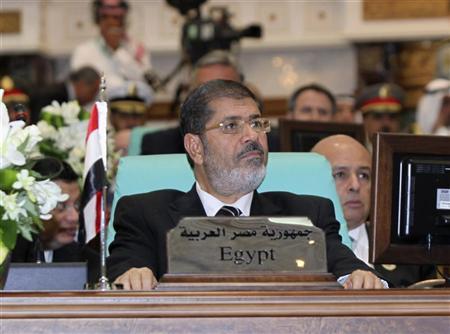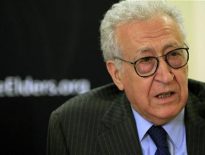By Yasmine Saleh
CAIRO (Reuters) – A media crackdown in the first month of Mohamed Mursi’s rule has raised fears Egypt’s Islamist president is moving to stifle criticism of the Muslim Brotherhood.

This week, formal accusations by state prosecutors were filed against two journalists, while an issue of the newspaper al-Dostour was confiscated by the state’s censorship unit – disappointing those who believed last year’s overthrow of President Hosni Mubarak would lead to greater media freedom.
Mursi, who resigned from the Muslim Brotherhood when he was elected in June, saying he wanted to represent all Egyptians, has also named Salah Abdel Maqsood, a former colleague from the Islamist group, as information minister.
“The Brotherhood’s recent actions against the media are harsh and unacceptable and tell us that we are going backwards and that things are managed the same way they were during Mubarak’s time,” rights activist Gamal Eid told Reuters.
The crackdown on media is also worrying the United States, which for years has secured the loyalty of one of the Arab world’s most influential states with substantial financial aid, now running at about $1.55 billion a year.
State Department spokeswoman Victoria Nuland said on Thursday that Washington was “concerned by reports that the Egyptian government is moving to restrict media freedom and criticism in Egypt.”
The Brotherhood has repeatedly denied any intention to censor opinion, saying it wants only to stop media reports which might incite violence or unrest, or which personally insult the president.
“Those who filed the complaints against the journalists with the public prosecutor are not all from the Brotherhood. There were also ordinary people upset about the disgusting insults that some media have been publicising,” Brotherhood spokesman Mahmoud Ghozlan told Reuters.
One of the two charged journalists is Islam Afifi, the editor of the daily al-Dostour newspaper, whose August 11 issue was confiscated. Afifi was sent to a criminal court after the state’s public prosecutor charged him with insulting Mursi and inciting the overthrow of Egypt’s ruling system.
The other one is Tawfiq Okasha, owner and the main host of an Egyptian television channel called Al-Faraeen who was also sent to a criminal court on accusations of inciting people to kill Mursi and insulting him. The prosecutor ordered the channel be taken off air.
Al-Faraeen TV channel is privately owned by Okasha, a strong opponent of Mursi and Islamists. Okasha had previously said in one of his talkshows that Mursi and his group “deserve to get killed”.
A Brotherhood lawyer also filed a complaint on Wednesday with a state prosecutor, accusing three prominent editors of Egyptian dailies including Afifi of insulting Mursi.
“I accused them of insulting the president and spreading false information that could destroy the state and create panic among the people,” lawyer Ismail al-Washahy told Reuters. “Most of what they published had nothing to do with media but were pure insults with no proof,” he added.
CODE OF ETHICS
The issue of Dostour newspaper that was banned ran on its front page a long list of accusations against the Brotherhood. It said the group was leading Egypt to “its worst decades … filled with killing and bloodshed.”
Afifi accused the Brotherhood of trying to stifle dissent. “It is an orchestrated campaign against the media by the Muslim Brotherhood. They want to silence any opposition to their policies,” Al-Ahram online news website quoted him as saying.
An earlier issue of Dostour released on June 21, before the results of the presidential elections were announced, ran a front-page article accusing the Brotherhood of planning a “massacre in Egypt” if Mursi lost.
The newspaper was bought three years ago by the Wafd Liberal party, a party whose critics said allowed itself to be used as a “friendly opposition” under Mubarak while the Brotherhood was officially banned.
Many Egyptians were upset with the media after the revolution which toppled Mubarak, saying it had misunderstood the responsibility that comes with media freedom. Some said journalists had often crossed the line in making personal insults and accusations without proof.
However, many critics are asking for a mechanism to implement a code of ethics, rather than taking criminal action against journalists.
“There are certainly violations in the media, but there are also ways to punish journalists other than dragging them to courts or prisons,” rights activist Eid said.
Three Egyptian columnists including prominent novelist Youssef El-Qaeed said earlier this month their columns had been removed by a new committee of editors used to supervise state-run newspapers for including anti-Brotherhood opinions.
The editors were chosen by the upper house of parliament, which is dominated by the Brotherhood and other Islamist groups.
Others left their columns empty in protest at the selection of the new editors.
“This white space… is in protest against the Muslim Brotherhood’s conquest over the newspapers and media outlets that belong to the Egyptian people,” columnist Gamal Fahmy wrote on the top of his empty column in al-Tahrir newspaper on August9.





